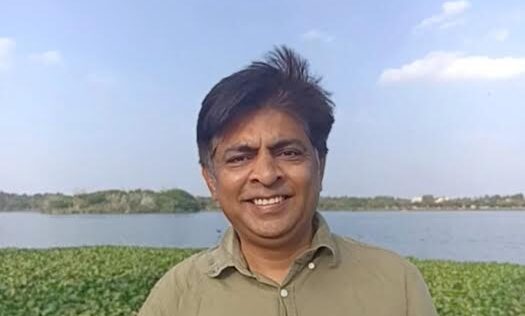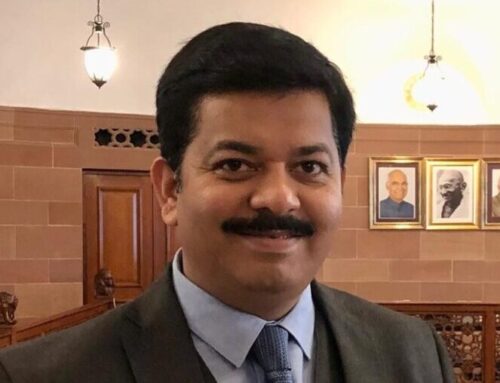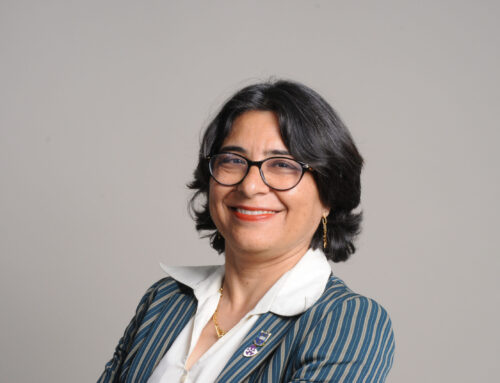John Hoffmire: I first met you in Oxford in 2018 when you were a Chevening CRISP Scholar. You were working for the Royal Society of Chemistry (RSC) and I thought that was a UK-based organization. You taught me otherwise.
Rajesh: It certainly had its beginnings in England. We were founded as The Chemical Society of London in 1841, in London, by a group of scientists, doctors, entrepreneurs and industrialists. They believed in the power of chemical science to change our world for the better. To take just one example, our first President, Thomas Graham, invented the life-saving process of dialysis.
Seven years later Queen Victoria granted a Royal Charter to the Society, confirming its purpose to be “the general advancement of Chemical Science”. In the 1980s, four chemical societies amalgamated to become the Royal Society of Chemistry.
Over the last 180 years, the RSC has evolved far beyond the scale imagined by our founders. Our mission is as relevant and valid as ever. We have stayed true to our mission – to advance excellence in the chemical sciences, for the good of science and humanity.
Today, we are a leading global chemistry community with around 50,000 members in over a hundred countries, including 23 local sections outside of the UK and Ireland. We are known as an internationally renowned quality publishing and not-for-profit knowledge business, with a reputation as an influential champion for the chemical sciences.
These local networks support RSC members living in their countries and, where possible, collaborate with local chemical societies to support the wider community.
Five local sections in India have played an important role in promoting chemical sciences in India and we are proud that they are the most active ones among our global network. India is a key part of the RSC as it is a major centre of chemical excellence. We set up an office within the country in 2010 to strengthen RSC’s presence. It is now the second biggest source of research in RSC journals, and its influence is growing rapidly.
We have engaged the Indian community at multiple levels. For example, through our Yusuf Hamied Inspirational Chemistry Programme, we have trained over 28,000 teachers across India. And we have organised several programmes for research collaborations between India and the UK.
We are embarking on exciting programmes in the next couple of years, focusing on gender diversity, innovation, and open science.
John: Tell me more, if you will, about what the RSC does throughout the world?
Rajesh: Though we are the oldest chemical society in the world, we are just as committed in the modern day to advancing excellence in chemical sciences.
Our work is focused on encouraging collaboration. We connect scientists with each other and society as a whole, so they can do their best work and make discoveries and innovation happen.
We publish 44 world-leading journals that span the core chemical sciences and related fields. Known for rigorous, fair peer review, and fast publication times, our journals publish the best science, from original research articles to authoritative reviews.
We develop, recognize, and celebrate professional capabilities. We bring people together to spark new ideas and new partnerships. We support teachers to inspire future generations of scientists.
And we speak up to influence the decision-makers in matters that influence us all. We are a catalyst for the chemistry that enriches our world at a time when such enrichment is definitely needed. With the global pandemic, the range of activities we participate in has never been more important.
John: Not long after you were in Oxford as a scholar of the Chevening Research Science and Innovation Leadership Programme (CRISP), you published an article titled ‘Chevening Diaries’ about your experiences in the programme. I’d love to hear about what you wrote, and what stands out for you now as a CRISP fellow, when you look back at it, three years on.
Rajesh: CRISP at Oxford was a wonderful experience. We expected nothing less than the best from Oxford, and we got it – pioneers in many fields went beyond their professional duty, enriching our knowledge, taking personal interest in our roles and aspirations, and refining our skills.
As you are aware, funded by the Foreign and Commonwealth Office, CRISP is designed to stimulate intellectual enquiry, to sharpen critical thinking skills, and support practical ambition and the creation of networks. It also offers its scholars an opportunity to experience UK culture and build lasting, positive relationships with the UK through professional development and extensive networking. I must admit that the programme delivered all of that, and more, beautifully.
One thing that stands out is that we had all sorts of cultural and travel opportunities to various stunning places throughout England – Oxford, Cambridge, castles, cathedrals, concerts, Derbyshire, Neolithic stone circles – we had a fantastic introduction to life in the UK. But it wasn’t all fun and no school, though. While the outdoor explorations carried on, we also focused on lectures and discussions, one-on-one mentoring, and coaching sessions on important themes – personal development, leadership management, networking, innovation, and entrepreneurship.
Discussions abounded around the relevance of the United Nations, how China sees India in the global scenario, and challenges around setting up an India-based Neutrino Observatory. A chance meeting with Lord Karan Billimoria, chairman of Cobra Beer, also resulted in a visit to the Houses of Parliament at Westminster.
Another aspect I will never forget is that we had the most diverse group of fellows working across sectors and industries – one came from a company with a history of over 150 years in India; one from the world’s largest e-retailer; one represented a home-grown start-up that intends to change the way we manage our energy consumption, while yet another fellow worked for a Japanese multinational based in Sri Lanka.
Apart from building extensive networks in the UK, the best part of the program was the way our CRISP fellows were willing to share their knowledge and expertise. We grew into a strong, close-knit network over a short period of time. The collateral benefit was a phenomenal amount of peer learning – sometimes over several mugs of beer across the famed pubs dotted throughout the UK. Often, through these outings, discussions and plans were put in place to work jointly, which would help our personal careers as well as that of the organizations we work with.
Looking back, I realize now that the networks, friendships, and collaborations we created, the CRISP alumni group we became a part of, keep the CRISP programme current and ever-present in my life. Three years ago, while I was part of the programme for 10 weeks, now I am a member of the networks we created, for life.
John: That is one of the best descriptions of the Chevening CRISP programme I’ve heard. I don’t think I could ask any question that could add to what you’ve just said. Thank you for being both a champion of chemistry, collaboration, and the CRISP programme. I wish you continued success in all that you do.
Rajesh: Thank you, John. It’s been my pleasure to reminisce about my time in Oxford and its lasting impact on my life.
Rajesh Parishwad is an External Relationships Manager, India at the Royal Society of Chemistry and an alum of the Chevening Research Science and Innovation Leadership Programme (CRISP), 2018.
Interviewer: Dr. John Hoffmire is the Chairman of the Center on Business and Poverty, and Research Associate at the Oxford Centre for Mutual and Co-owned Business
To learn more about Rajesh’s work with the Royal Society of Chemistry:
Invited Talk Session: Natural Products – Rajesh Parishwad, Royal Society of Chemistry






